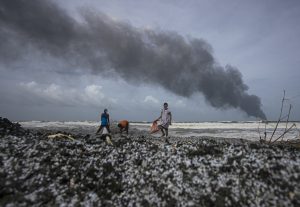Sri Lanka is staring at an environmental catastrophe.
On May 20, a fire erupted on a container ship, MV X-Press Pearl, anchored at a distance of around 9 nautical miles northwest of Colombo. The Singapore-flagged vessel was loaded with 1,486 containers carrying 25 tons of nitric acid and other chemicals as well as raw materials to manufacture plastic bags. The ship was also carrying 300 tons of fuel in its tanks.
The fire, which raged for a fortnight, has been doused. An attempt by salvage experts to tow the ship into deeper waters to contain the damage to the coastline failed when the ship began sinking on June 2.
Sri Lanka is now bracing for an oil spill.
This is “one of the worst marine disasters that has happened in Sri Lanka,” said marine biologist Dr. Asha de Vos.
Sri Lanka is strategically located: Just 6 to 10 nautical miles south of the island lies the busy East-West shipping route. Over 60,000 ships carrying two-thirds of the world’s oil and half its container shipments ply this route annually.
Despite the heavy maritime traffic, major ship accidents are relatively rare.
However, this is the second accident to take place off the Sri Lankan coast over the last 10 months.
In September last year, a Panamanian-registered oil tanker, New Diamond, which was carrying 270,000 tons of crude oil from Kuwait to India, caught fire. Fortunately for Sri Lanka, the tanker didn’t break up. The island thus escaped the disastrous impact of a major oil slick.
This time the island is less lucky.
Toxic and highly corrosive chemicals have been released into the sea. “The damage to the marine ecosystem is incalculable,” said Hemantha Withanage, executive director of Sri Lanka’s Center for Environmental Justice.
Scientists are pointing out that the plastic micro-pellets will be far more damaging than the chemicals that X-Press Pearl spewed into the sea. The chemicals on board the ship burned or poured into the sea and would have dissolved. So the impact of chemicals, according to marine biologist Asha de Vos, “is mostly localized and short term.” This isn’t the case with plastic micro-pellets. Being buoyant, they are carried over long distances by waves. Plastic micro-pellets have washed ashore, blanketing long stretches of Sri Lanka’s coastline, de Vos pointed out.
Although Sri Lanka has started cleaning up its beaches, the damage done is permanent as plastic micro-pellets are “not biodegradable,” said Charitha Pattiaratchi, a professor of coastal oceanography at the University of Western Australia.
Micro-pellets are often ingested by fish, where they enter the food chain. Plastic entering the food chain has implications for human health. People will avoid consuming fish, which will impact the livelihood of fishermen.
Tourism, which is an important component of the Sri Lankan economy, is likely to be severely affected as well. Tourists would prefer to stay away from the island’s beaches.
Sri Lankan officials believe that the fire was caused by a nitric acid leak on board the ship. Apparently, the ship’s crew were aware of this leak since May 11 and had sought to dock in Qatar and India but were denied permission by authorities in the both countries.
That Sri Lankan authorities allowed the ship to anchor off its coast when two other countries had turned it away has triggered public outrage in the country.

































